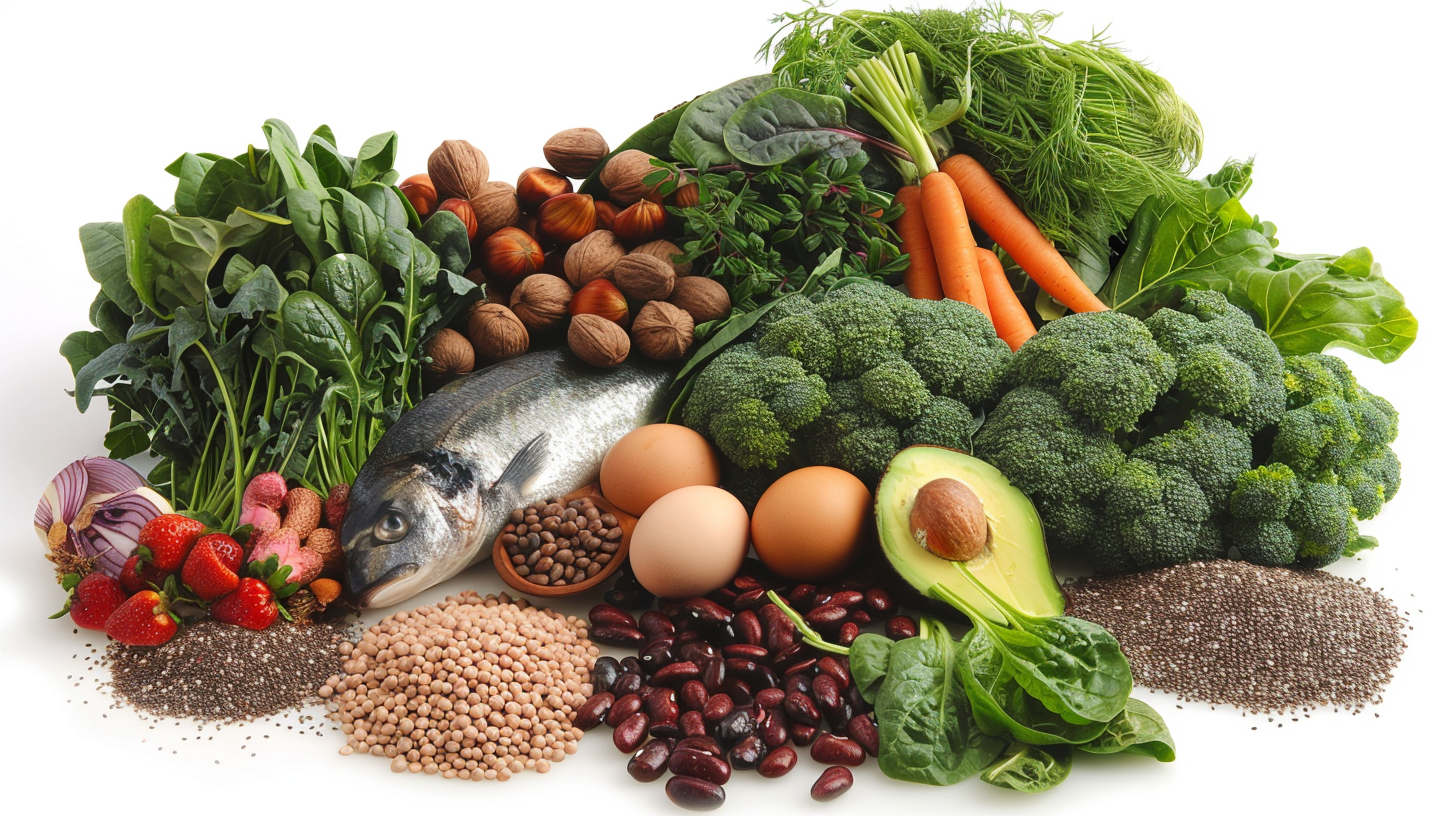
Maintaining healthy blood sugar levels is crucial for overall health, especially for those managing diabetes or prediabetes. Diet plays a significant role in blood sugar control, and incorporating certain foods into your meals can help keep your levels in check. Here are the top 15 best foods that lower blood sugar.
1. Leafy Greens
Leafy greens like spinach, kale, and Swiss chard are low in calories and carbohydrates but rich in fiber, vitamins, and minerals. They have a low glycemic index (GI), which means they have a minimal impact on blood sugar levels. Their high magnesium content also helps improve insulin sensitivity.
2. Berries
Berries, including strawberries, blueberries, raspberries, and blackberries, are packed with antioxidants, vitamins, and fiber. They have a lower GI compared to other fruits, making them a better choice for blood sugar management. The fiber content in berries slows down sugar absorption, preventing spikes in blood sugar levels.
3. Nuts and Seeds
Nuts and seeds like almonds, walnuts, chia seeds, and flaxseeds are excellent sources of healthy fats, fiber, and protein. These nutrients help stabilize blood sugar levels by slowing the absorption of glucose. Regular consumption of nuts and seeds has been linked to improved blood sugar control and reduced risk of heart disease.
4. Fatty Fish
Fatty fish such as salmon, mackerel, sardines, and trout are rich in omega-3 fatty acids, which have anti-inflammatory properties and can improve insulin sensitivity. The protein content in fish also helps regulate blood sugar levels by slowing digestion and the absorption of carbohydrates.
5. Whole Grains
Whole grains like oats, quinoa, barley, and brown rice are high in fiber, which helps slow the release of glucose into the bloodstream. Unlike refined grains, whole grains retain their nutrient-rich bran and germ, providing essential vitamins, minerals, and antioxidants.
6. Avocados
Avocados are packed with healthy monounsaturated fats, fiber, vitamins, and minerals. The healthy fats in avocados help improve insulin sensitivity and keep you feeling full longer, which can prevent overeating and subsequent blood sugar spikes.
7. Beans and Legumes
Beans and legumes such as lentils, chickpeas, black beans, and kidney beans are excellent sources of plant-based protein, fiber, and complex carbohydrates. These nutrients help stabilize blood sugar levels by slowing down digestion and the absorption of sugar into the bloodstream.
8. Cinnamon
Cinnamon is a popular spice known for its ability to lower blood sugar levels. It enhances insulin sensitivity and helps improve glucose metabolism. Adding a small amount of cinnamon to your diet can have a beneficial impact on blood sugar control.
9. Garlic
Garlic has been shown to improve insulin sensitivity and reduce fasting blood sugar levels. It contains compounds like allicin, which have anti-inflammatory and antioxidant properties. Incorporating garlic into your meals can provide both flavor and health benefits.
10. Apple Cider Vinegar
Apple cider vinegar has been found to improve insulin sensitivity and lower blood sugar levels, especially after meals. It slows down the digestion of carbohydrates and the absorption of sugar into the bloodstream. Adding a small amount of apple cider vinegar to your diet, such as in salad dressings or diluted in water, can help manage blood sugar levels.
11. Sweet Potatoes
Sweet potatoes have a lower GI compared to regular potatoes and are rich in fiber, vitamins, and minerals. The fiber content in sweet potatoes helps slow the absorption of sugar, preventing rapid spikes in blood sugar levels. They are also a good source of antioxidants like beta-carotene, which can have additional health benefits.
12. Greek Yogurt
Greek yogurt is high in protein and probiotics, which can help regulate blood sugar levels. The protein content in Greek yogurt slows down digestion, reducing the impact of carbohydrates on blood sugar. Probiotics also promote a healthy gut microbiome, which can improve insulin sensitivity.
13. Broccoli and Broccoli Sprouts
Broccoli and broccoli sprouts are rich in fiber, vitamins, minerals, and antioxidants like sulforaphane, which has been shown to improve insulin sensitivity and reduce blood sugar levels. Including these cruciferous vegetables in your diet can provide multiple health benefits, including better blood sugar control.
14. Chia Seeds
Chia seeds are a powerhouse of nutrients, including fiber, protein, omega-3 fatty acids, and antioxidants. The high fiber content in chia seeds helps slow the absorption of sugar into the bloodstream, preventing blood sugar spikes. They can be easily added to smoothies, yogurt, or oatmeal for a nutritious boost.
15. Eggs
Eggs are an excellent source of high-quality protein, which helps regulate blood sugar levels by slowing down digestion. They are also rich in essential nutrients like vitamins A, D, E, and B12, as well as minerals such as iron and zinc. Including eggs in your diet can help improve blood sugar control and provide sustained energy throughout the day.
Tips for Incorporating Blood Sugar-Friendly Foods into Your Diet
- Plan Balanced Meals: Include a variety of these blood sugar-friendly foods in your meals to ensure a balanced intake of nutrients. Aim to fill half your plate with non-starchy vegetables, a quarter with lean protein, and a quarter with whole grains or complex carbohydrates.
- Snack Wisely: Choose snacks that combine protein, healthy fats, and fiber to help stabilize blood sugar levels. For example, pair a handful of nuts with a piece of fruit or enjoy Greek yogurt with a sprinkle of chia seeds.
- Stay Hydrated: Drink plenty of water throughout the day to support overall health and help regulate blood sugar levels. Avoid sugary drinks and opt for water, herbal teas, or beverages sweetened with natural low-calorie sweeteners.
- Monitor Portions: Pay attention to portion sizes, especially for carbohydrate-rich foods. Eating too much, even of healthy foods, can lead to blood sugar spikes. Use measuring cups or a food scale to ensure you’re eating appropriate portions.
- Be Consistent: Aim to eat at regular intervals and avoid skipping meals, as this can cause blood sugar fluctuations. Eating consistent, balanced meals can help maintain steady blood sugar levels throughout the day.
Conclusion
Incorporating these top 15 blood sugar-lowering foods into your diet can help you manage your blood sugar levels and improve your overall health. Remember, making dietary changes is just one part of a comprehensive approach to blood sugar management. Regular exercise, stress management, and proper medication (if prescribed) are also essential components of maintaining healthy blood sugar levels.
By focusing on a balanced diet rich in nutrient-dense, blood sugar-friendly foods, you can take control of your health and reduce the risk of complications associated with high blood sugar. Always consult with a healthcare professional or registered dietitian before making significant changes to your diet, especially if you have a medical condition like diabetes.






Leave a Reply